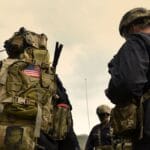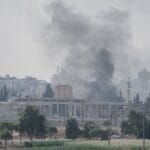
„Let’s take a look at the numbers. (While the following statistics are estimates, they will, if anything, get worse with the continuing matrix of wars in Syria.) More than 80 percent of Syrians live below the poverty line. Nearly 70 percent of Syrians live in extreme poverty, meaning they cannot secure basic needs, according to a 2016 report. That number has most likely grown since then. The unemployment rate is close to 58 percent, with a significant number of those employed working as smugglers, fighters or elsewhere in the war economy. Life expectancy has dropped by 20 years since the beginning of the uprising in 2011. About half of children no longer attend school – a lost generation. The country has become a public health disaster. Diseases formerly under control, like typhoid, tuberculosis, Hepatitis A and cholera, are once again endemic. And polio – previously eradicated in Syria – has been reintroduced, probably by fighters from Afghanistan and Pakistan.
Upward of 500,000 are dead from the war, and an untold number of Syrians have died indirectly from the conflict (the price for destroying hospitals, targeting health care professionals and using starvation as a weapon). With more than two million injured, about 11.5 percent of the prewar population have become casualties. And close to half the population of Syria is either internally or externally displaced. A 2015 survey conducted by the United Nations refugee agency looking at Syrian refugees in Greece found that a large number of adults – 86 percent – had secondary or university education. Most of them were under 35. If true, this indicates that Syria is losing the very people it will most need if there is to be any hope of rebuilding in the future.“






